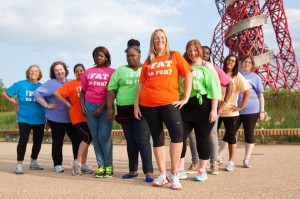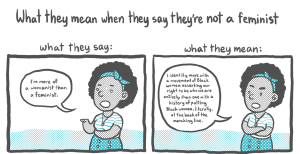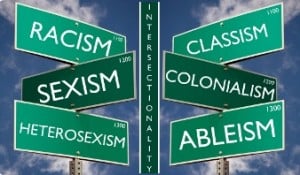
Credit: Too Fat To Run and taken by VIPDigitalphotography
I received a letter from an Everyday Feminism reader asking for a moratorium on descriptors like “curvy” and “BBW” and requesting that I exclusively use the word “fat” in my articles.
The reader wrote: ”’Curvy’ is for milquetoast Lane Bryant customers and the regressive ‘Real Women Have Curves’ mentality. ‘Curvy’ is not empowering. It is minimizing the fat experience. The word ‘curvy’ alienates all of the fat- and body-positive people who have worked so hard to get where we are.” [Reprinted with the author’s permission.]
I saw the validity of this request and promised I would seriously consider it.
I always keep my promises.
My personal use of the word fat began very gradually.
I look at old journal entries or blog entries I wrote and see that the word “fat” pops up here and there, but I started using the word “fat” to refer to myself consistently probably just about three years ago when I started meeting people in fat activist communities.
I found myself drawn to the radical nature of the word, and I felt like it was the word that had been used most often to silence me and hurt me.
The word fat – and using that word to refer to my body – became a path to healing and embodiment.
And now it’s a word that feels like home.
So, when I received this e-mail, I couldn’t put my finger on why, at first, something didn’t feel right about the idea of a moratorium.
So I explored this feeling through conversations with women I know and asked four of them what words they loved when it came to describing their big bodies.
And here’s what we came up with.
Big Beautiful Woman (BBW)
The first person I thought of when I starting thinking about this article was Tigress Osborn.
She wrote a chapter for my new anthology, Hot & Heavy: Fierce Fat Girls on Life, Love and Fashion. She is a diversity educator, a woman of color, the founder of Full Figure Entertainment, and one of the most radically fat-positive people I have ever met.
But in her chapter, she wrote specifically about why she likes the descriptor BBW:
“I like to use the word fat because it’s unapologetic and political. But I like BBW because it’s the term that first introduced me to the idea that fat women could consider themselves beautiful and say so with pride.
“I have learned, after all these years, to include myself in that vision of big beauty instead of seeing it as something other women could be, but that I never would be.”
For many women, “beautiful” is a charged word.
It brings to mind oppressive ideals (and scenes from Mean Girls).
Many feminists (myself included) have a complicated relationship with the B-word, but when I listen to Tigress, I remember how using that word began to change the way I saw myself and my body.
In fact, “Hello, beautiful” was the way my friends and I greeted each other as we started down our path to becoming body positive in college.
I love the way that there’s history there for Tigress, too.
There is something powerful about re-envisioning and laying claim to a word that’s been used to exclude so many women – especially big women – for so long.
Fat
Rachel (aka The Near-Sighted Owl) was my next destination.
I will be meeting Rachel in a little over two weeks for the first time, but am in love with her blog, her fashion, and her brilliance.
Here’s her two cents on why she prefers the f-word:
“Describing myself as fat is empowering. Fat is not a negative word to me. It is my identity and a neutral description (like tall or brunette). Not about putting a pretty bow on it or sugarcoating or hiding behind words like curvy or chubby.
“There is a fat movement of fantastic and inspiring women. We have fat fashion, fat blogs, fat activism, fat books, literally everything you can think of that creates a space for fat people.
“Fat is a feminist word. It has been reclaimed and transformed from an insult. I love the word fat. It gives me strength and courage. Such a simple three-letter word. We have fat or adipose tissue.
“As kids, we knew the word fat. Santa was fat, our neighbor was fat, and mom was fat, but she didn’t like using that word. We got older and girls at school start using the word to defame their competition. It was a word we whispered when it wasn’t being hurtfully shouted. It was a dirty word.
“Saying you’re fat is just saying you have more visible fat than a thin person does. Calling someone fat is only body shaming when you think being fat is shameful.”
Changing your relationship to the word “fat” can be a challenge.
As Rachel mentioned (and I’m sure you know), fat is a word not spoken in “polite” company. It’s been used to scare and silence people for decades.
The word fat is a powerful little word.
Fat has the power to make me feel sexy (when whispered in my ear by a lover), bad-ass (when I invoke it), indignant (when someone tries to use to scare me and I’m feeling brave) or incredibly vulnerable (when someone uses it to hurt me and I don’t have it in me to fight back).
Nowadays, it’s my word of choice in terms of how I identify my body, but that took a lot of time – and many re-readings of Miss Piggy’s Guide to Life.
Plush
I hopped on Facebook and asked women to tell me what body descriptors they preferred and why, and my friend Elizabeth wrote that she likes plush (or plushy):
“I love this word. In part, because I can’t think of a single negative connotation associated with it.
“Plush is soft and cuddly like a plush stuffed animal. Plush is deep, thick, and comforting, like plush carpet. Plush is used to describe surroundings that are rich and elegant, if not a bit overindulgent or decadent.
“I am a plushy girl. I am soft, cuddly, deep, comforting, elegant, and maybe a bit decadent.”
Mmmm… decadent!
Though I’ve never used the word plush to describe my body, I might need to start.
I am an unapologetic hedonist, and Elizabeth’s words resonate with the part of me that feels the need for daily doses of oysters and champagne aboard USS Plushy Pants.
Curvy
I asked Chrystal of Curvy Girl Lingerie in San Jose, California what she loves so much about that word, to the point that she would name her livelihood after it. Brilliantly, she said:
“My whole life, I have identified as a ‘fat girl’ or ‘big girl.’ I have been bigger than your average bear since the third grade.
“I am 45 now, so I have had a long time to get used to the word fat. I find ‘overweight’ to be so judgy. Over what weight?
“The word fat does not offend me anymore. And I even kind of really like the word ‘fat’ when there is lots of love behind it. ‘I love your fat ass’ sounds really hot to me in the right romantic situation. But ‘Fat Girl Lingerie’ felt like it had the potential to offend and trigger too many people.
“When I was trying to invent the name of my store, Curvy Girl Lingerie, I just fell in love with the word.
“The definition of ‘curve’ is ‘a line or outline that gradually deviates from being straight for some or all of its length.’ I thought that definition sounded like the perfect metaphor for what I was creating.
“Fat, voluptuous, plump, and curvy bodies ‘deviate’ from the typical body you constantly see on the cover of magazines or in other pop media. And my store ‘deviates’ by serving those wonderfully beautiful, fat, rubenesque, chunky, plump, thick, phat women who are sexy and hot as hell.
“I think even if you do not have any clue what we do when you drive by my store, when you see the words ‘Curvy Girl.’ you get a pretty clear picture of who we are and who we serve.”
Chrystal said something I’d never thought about: Curves really are radical deviations.
The first time I ever went into Chrystal’s shop, I felt the joy of seeing lingerie in my size and sharing physical space with other curvy women shopping for vibrators and high heels covered in cupcakes.
Curvy is a sexy word that makes me think of all the deviant lines under my clothes.
AndI see Chrystal taking this word and using it to make space for women to feel sexy at every size.
I’m Tired of How Intolerant the Body Love Movement Is!
Or: Why We Need to Make Room for Identities Beside “Fat”
In a conversation with two fat friends over a large bowl of spiked punch at Forbidden Island in Alameda, one of them said something that forced me to stop and think about my own fat positive politics.
She said, “I’m tired of how intolerant the body love movement is.”
What?!
I asked her to continue, and she said that mandatory self-love – with all the language and the expectations – was too much to ask from most women, especially single moms (like her) struggling to make a dollar out of fifteen cents.
And that, my friend, is how I got schooled.
Calling oneself fat is a radical, courageous, and highly political move.
It takes guts to use that word, but it also takes a lot more than guts sometimes.
Building my fat identity has involved a lot of time and plenty of income: time to read fat positive blogs and books, time to spend with other fat-identified people who support me emotionally, disposable income to attend conferences, graduate school and a core sense that I can safely call myself fat and act on my radical fat politics because I don’t depend on anyone but myself for income and I have all the emotional support I need.
I’m not saying that everyone comes to the word “fat” through considerable expenditure, but what I am saying is that the most radical members of movements often have considerable advantages including time and money.
I have become so accustomed to calling myself fat – and fat being a word that I associate with pride and joy – that at times, I forget how radical (and scary) an act it truly is.
And I think that when we make room for only the most radical people or the most radical vocabulary, we leave many people behind.
So, in regards to the e-mail, I realized that a moratorium didn’t feel right because it limits me and the women I write about from identifying in ways that feel good (and safe) to them.
And so, concerned reader, in response to your request for a moratorium, I hope you’ll understand that I must respectfully decline.
[do_widget id=‘text-101′]
Virgie Tovar, MA is a Contributing Writer for Everyday Feminism and the editor of the book, Hot & Heavy: Fierce Fat Girls on Life, Love and Fashion. Virgie is one of the nation’s leading experts and lecturers in the areas of fat discrimination and body image. She lives in San Francisco. Find her online at www.virgietovar.com.
Search our 3000+ articles!
Read our articles about:
Our online racial justice training
Used by hundreds of universities, non-profits, and businesses.
Click to learn more




















